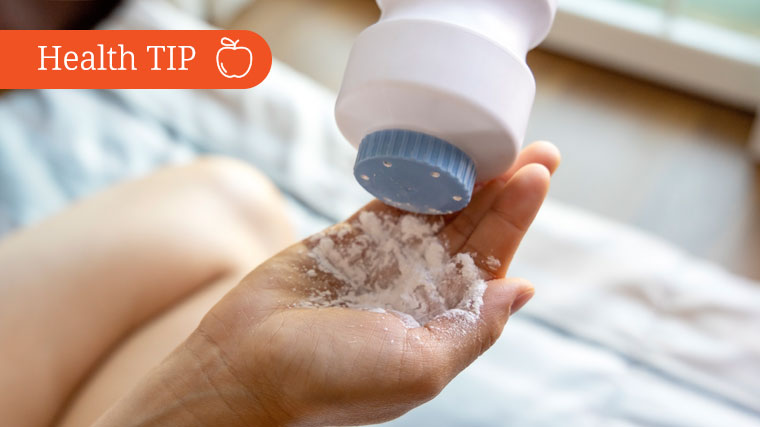Cancer
When cells in your body grow out of control, cancer results. And it can spread to other parts of your body. Premier Health providers offer advice on how to lower your risk of developing cancer, how to recognize cancer signs, and how cancer is diagnosed
to help catch it early and raise the chance of successful treatment.
Talcum Powder And Ovarian Cancer: Is There a Link?

Find Your Perfect Match
Answer a few questions and we'll provide you with a list of primary care providers that best fit your needs.
Talcum powder has been mentioned as a possible cause of ovarian cancer, in news reports and social media posts.
But it’s not that clear whether talcum powder actually raises cancer risk, says gynecologic oncologist Michael Guy, MD. “The best studies we have look forward in time to identify people’s exposure to talcum powder and to follow them to see about their risks for cancers. And it doesn’t appear there’s a strong link between the use of talcum powder and development of ovary cancer.”
The National Institutes of Health reports that studies have suggested the presence of cancer-causing agents, like asbestos, in some talcum powders, but have not conclusively proven them to be a direct cause of cancer. However, there may be a risk of asbestos-containing talc being able to cause cancer when inhaled.
Dr. Guy talks about the talcum powder-ovarian cancer link.
Click play to watch the video or read video transcript.
The use of talcum powder and ovarian cancer is often talked about in the news and on television and social media today. The short answer is it's difficult to say. The best studies that we have look forward in time to identify people's exposure to talcum powder and to follow them to see about their risk for cancers. It doesn't appear like there's a strong link between the use of talc powder and the development of ovarian cancer.
There have been suggestions that talcum powder might cause cancer in the ovaries when applied to the genital area or on sanitary napkins, diaphragms, or condoms. The American Cancer Society reports that some studies have suggested that talcum powder could possibly increase cancer risk in certain groups of women. For instance, women who have an intact reproductive tract.
Proving a talcum powder-ovarian cancer link, though, is complicated by the fact that ovarian cancer is a relatively uncommon cancer. Very large studies would be required to detect an increase in risk, the American Cancer Society explains.
Find Your Perfect Match
Answer a few questions and we'll provide you with a list of primary care providers that best fit your needs.
Source: Michael Guy, MD, Premier Gynecologic Oncology; American Cancer Society; National Institutes of Health
Talcum Powder And Ovarian Cancer: Is There a Link?

Find Your Perfect Match
Answer a few questions and we'll provide you with a list of primary care providers that best fit your needs.
Talcum powder has been mentioned as a possible cause of ovarian cancer, in news reports and social media posts.
But it’s not that clear whether talcum powder actually raises cancer risk, says gynecologic oncologist Michael Guy, MD. “The best studies we have look forward in time to identify people’s exposure to talcum powder and to follow them to see about their risks for cancers. And it doesn’t appear there’s a strong link between the use of talcum powder and development of ovary cancer.”
The National Institutes of Health reports that studies have suggested the presence of cancer-causing agents, like asbestos, in some talcum powders, but have not conclusively proven them to be a direct cause of cancer. However, there may be a risk of asbestos-containing talc being able to cause cancer when inhaled.
Dr. Guy talks about the talcum powder-ovarian cancer link.
Click play to watch the video or read video transcript.
The use of talcum powder and ovarian cancer is often talked about in the news and on television and social media today. The short answer is it's difficult to say. The best studies that we have look forward in time to identify people's exposure to talcum powder and to follow them to see about their risk for cancers. It doesn't appear like there's a strong link between the use of talc powder and the development of ovarian cancer.
There have been suggestions that talcum powder might cause cancer in the ovaries when applied to the genital area or on sanitary napkins, diaphragms, or condoms. The American Cancer Society reports that some studies have suggested that talcum powder could possibly increase cancer risk in certain groups of women. For instance, women who have an intact reproductive tract.
Proving a talcum powder-ovarian cancer link, though, is complicated by the fact that ovarian cancer is a relatively uncommon cancer. Very large studies would be required to detect an increase in risk, the American Cancer Society explains.
Find Your Perfect Match
Answer a few questions and we'll provide you with a list of primary care providers that best fit your needs.
Source: Michael Guy, MD, Premier Gynecologic Oncology; American Cancer Society; National Institutes of Health
Talcum Powder And Ovarian Cancer: Is There a Link?

Find Your Perfect Match
Answer a few questions and we'll provide you with a list of primary care providers that best fit your needs.
Talcum powder has been mentioned as a possible cause of ovarian cancer, in news reports and social media posts.
But it’s not that clear whether talcum powder actually raises cancer risk, says gynecologic oncologist Michael Guy, MD. “The best studies we have look forward in time to identify people’s exposure to talcum powder and to follow them to see about their risks for cancers. And it doesn’t appear there’s a strong link between the use of talcum powder and development of ovary cancer.”
The National Institutes of Health reports that studies have suggested the presence of cancer-causing agents, like asbestos, in some talcum powders, but have not conclusively proven them to be a direct cause of cancer. However, there may be a risk of asbestos-containing talc being able to cause cancer when inhaled.
Dr. Guy talks about the talcum powder-ovarian cancer link.
Click play to watch the video or read video transcript.
The use of talcum powder and ovarian cancer is often talked about in the news and on television and social media today. The short answer is it's difficult to say. The best studies that we have look forward in time to identify people's exposure to talcum powder and to follow them to see about their risk for cancers. It doesn't appear like there's a strong link between the use of talc powder and the development of ovarian cancer.
There have been suggestions that talcum powder might cause cancer in the ovaries when applied to the genital area or on sanitary napkins, diaphragms, or condoms. The American Cancer Society reports that some studies have suggested that talcum powder could possibly increase cancer risk in certain groups of women. For instance, women who have an intact reproductive tract.
Proving a talcum powder-ovarian cancer link, though, is complicated by the fact that ovarian cancer is a relatively uncommon cancer. Very large studies would be required to detect an increase in risk, the American Cancer Society explains.
Find Your Perfect Match
Answer a few questions and we'll provide you with a list of primary care providers that best fit your needs.
Source: Michael Guy, MD, Premier Gynecologic Oncology; American Cancer Society; National Institutes of Health
Cancer Information for Women
Talcum Powder And Ovarian Cancer: Is There a Link?

Find Your Perfect Match
Answer a few questions and we'll provide you with a list of primary care providers that best fit your needs.
Talcum powder has been mentioned as a possible cause of ovarian cancer, in news reports and social media posts.
But it’s not that clear whether talcum powder actually raises cancer risk, says gynecologic oncologist Michael Guy, MD. “The best studies we have look forward in time to identify people’s exposure to talcum powder and to follow them to see about their risks for cancers. And it doesn’t appear there’s a strong link between the use of talcum powder and development of ovary cancer.”
The National Institutes of Health reports that studies have suggested the presence of cancer-causing agents, like asbestos, in some talcum powders, but have not conclusively proven them to be a direct cause of cancer. However, there may be a risk of asbestos-containing talc being able to cause cancer when inhaled.
Dr. Guy talks about the talcum powder-ovarian cancer link.
Click play to watch the video or read video transcript.
The use of talcum powder and ovarian cancer is often talked about in the news and on television and social media today. The short answer is it's difficult to say. The best studies that we have look forward in time to identify people's exposure to talcum powder and to follow them to see about their risk for cancers. It doesn't appear like there's a strong link between the use of talc powder and the development of ovarian cancer.
There have been suggestions that talcum powder might cause cancer in the ovaries when applied to the genital area or on sanitary napkins, diaphragms, or condoms. The American Cancer Society reports that some studies have suggested that talcum powder could possibly increase cancer risk in certain groups of women. For instance, women who have an intact reproductive tract.
Proving a talcum powder-ovarian cancer link, though, is complicated by the fact that ovarian cancer is a relatively uncommon cancer. Very large studies would be required to detect an increase in risk, the American Cancer Society explains.
Find Your Perfect Match
Answer a few questions and we'll provide you with a list of primary care providers that best fit your needs.
Source: Michael Guy, MD, Premier Gynecologic Oncology; American Cancer Society; National Institutes of Health
Cancer Information for Men
Talcum Powder And Ovarian Cancer: Is There a Link?

Find Your Perfect Match
Answer a few questions and we'll provide you with a list of primary care providers that best fit your needs.
Talcum powder has been mentioned as a possible cause of ovarian cancer, in news reports and social media posts.
But it’s not that clear whether talcum powder actually raises cancer risk, says gynecologic oncologist Michael Guy, MD. “The best studies we have look forward in time to identify people’s exposure to talcum powder and to follow them to see about their risks for cancers. And it doesn’t appear there’s a strong link between the use of talcum powder and development of ovary cancer.”
The National Institutes of Health reports that studies have suggested the presence of cancer-causing agents, like asbestos, in some talcum powders, but have not conclusively proven them to be a direct cause of cancer. However, there may be a risk of asbestos-containing talc being able to cause cancer when inhaled.
Dr. Guy talks about the talcum powder-ovarian cancer link.
Click play to watch the video or read video transcript.
The use of talcum powder and ovarian cancer is often talked about in the news and on television and social media today. The short answer is it's difficult to say. The best studies that we have look forward in time to identify people's exposure to talcum powder and to follow them to see about their risk for cancers. It doesn't appear like there's a strong link between the use of talc powder and the development of ovarian cancer.
There have been suggestions that talcum powder might cause cancer in the ovaries when applied to the genital area or on sanitary napkins, diaphragms, or condoms. The American Cancer Society reports that some studies have suggested that talcum powder could possibly increase cancer risk in certain groups of women. For instance, women who have an intact reproductive tract.
Proving a talcum powder-ovarian cancer link, though, is complicated by the fact that ovarian cancer is a relatively uncommon cancer. Very large studies would be required to detect an increase in risk, the American Cancer Society explains.
Find Your Perfect Match
Answer a few questions and we'll provide you with a list of primary care providers that best fit your needs.
Source: Michael Guy, MD, Premier Gynecologic Oncology; American Cancer Society; National Institutes of Health






